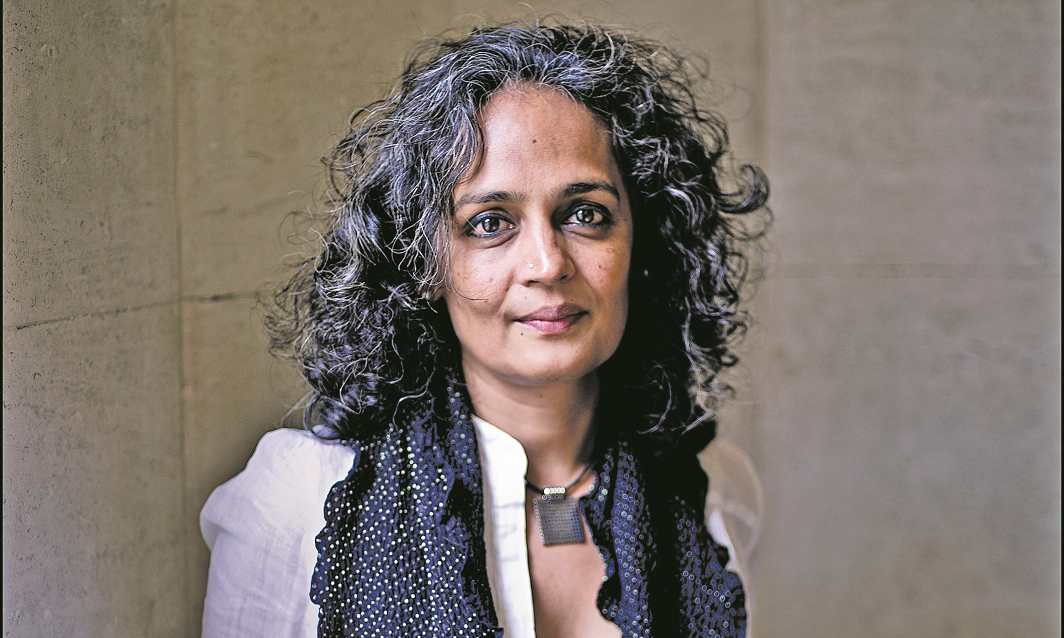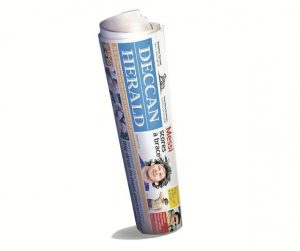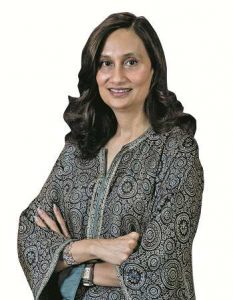Danger of Fake News
 All of last week Arundhati Roy’s alleged interview to a “Pakistani paper”, The Times of Islamabad triggered much angst among hyper-nationalists in India. In the so-called interview, the Booker Prize winning author had said: “India cannot achieve its objective in the occupied valley even if its army deployment is raised from 7 lakh to 70 lakh since Kashmiris have remained committed to their anti-India sentiments for many years”. This had prompted actor and BJP MP, Paresh Rawal to tweet the infamous line that spawned animated debates: “Instead of tying stone pelter on the army jeep tie Arundhati Roy!”
All of last week Arundhati Roy’s alleged interview to a “Pakistani paper”, The Times of Islamabad triggered much angst among hyper-nationalists in India. In the so-called interview, the Booker Prize winning author had said: “India cannot achieve its objective in the occupied valley even if its army deployment is raised from 7 lakh to 70 lakh since Kashmiris have remained committed to their anti-India sentiments for many years”. This had prompted actor and BJP MP, Paresh Rawal to tweet the infamous line that spawned animated debates: “Instead of tying stone pelter on the army jeep tie Arundhati Roy!”
What led to Rawal’s outburst was fake news carried by the website postcard.news which picked up a story from a “nationalist” portal across the border called The Times of Islamabad which alleged that Roy had “recently made the statement in Kashmir”. The truth is that the writer and activist had not visited the Valley or written or issued statements on the Kashmir issue for almost a year! And pray, what do we know about postcard.news? Well, it was started last year “not just to counter the lies of the mainstream media” but also to “showcase positive changes in the country.” Incidentally, several other “nationalist” websites also carried the fake interview story.
The Digital Doom
 After winding up its Delhi edition, the Deccan Herald will soon transform into a “digital era media group”. This is expected to bring about several sweeping changes in the old style of functioning as well as restructuring of staff. A new CEO has been hired to affect the changes which has spread panic among the staff. Apparently, the inspiration for embracing the digital world has come from the Hindustan Times which had wound up several editions and cut jobs earlier this year in the name of transforming itself.
After winding up its Delhi edition, the Deccan Herald will soon transform into a “digital era media group”. This is expected to bring about several sweeping changes in the old style of functioning as well as restructuring of staff. A new CEO has been hired to affect the changes which has spread panic among the staff. Apparently, the inspiration for embracing the digital world has come from the Hindustan Times which had wound up several editions and cut jobs earlier this year in the name of transforming itself.
Foreign Dependence
 Shobna Bhartia, chairperson of the Hindustan Times group, seems to believe that the editors she hires should have international credentials. She hired Nicholas Dawes from South Africa where he was editor-in-chief of the Mail & Guardian, as Chief Content Officer of Hindustan Times. After he left, she brought in Bobby Ghosh, who had been World Editor at Time magazine, and then editor at Quartz, as editor-in-chief of the paper. She has now brought back another foreign acquisition—well-known NRI journalist, Raju Narisetti, who has held top positions with The Wall Street Journal and The Washington Post. He has been hired, or re-hired, to launch a brand new business paper for the group. Hindustan Times already publishes Mint, a pink paper and this is something of a homecoming for Narisetti—Bhartia had brought him in to help as founding editor but he returned to America shortly after.
Shobna Bhartia, chairperson of the Hindustan Times group, seems to believe that the editors she hires should have international credentials. She hired Nicholas Dawes from South Africa where he was editor-in-chief of the Mail & Guardian, as Chief Content Officer of Hindustan Times. After he left, she brought in Bobby Ghosh, who had been World Editor at Time magazine, and then editor at Quartz, as editor-in-chief of the paper. She has now brought back another foreign acquisition—well-known NRI journalist, Raju Narisetti, who has held top positions with The Wall Street Journal and The Washington Post. He has been hired, or re-hired, to launch a brand new business paper for the group. Hindustan Times already publishes Mint, a pink paper and this is something of a homecoming for Narisetti—Bhartia had brought him in to help as founding editor but he returned to America shortly after.
More Fake news
In another shocking example of fake news, social media has been abuzz with claims that development economist and columnist, Jean Drèze, was a foreigner and questioning how a Belgian national was allowed on governmental advisory panels (he was a member of the National Advisory Panel under UPA and his expertise has been used subsequently by various ministries). The origin of the controversy was a tweet by Shefali Vaidya, a columnist at Swarajya, who also claimed that Drèze’s wife, activist Bela Bhatia, was a Maoist supporter.
The truth is that Drèze actually became an Indian national in 2002 when he voluntarily gave up his Belgian citizenship.
Tailpiece
A study conducted on 40 journalists, members of the London Press Club, showed that their “brains were operating at a lower level than the average population”. The reason given is that “they were drinking too much, dehydration and too much caffeine and high sugar food”. A similar study at the Delhi Press Club would probably come up with similar results.


